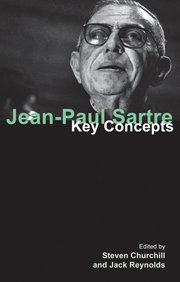Book contents
- Frontmatter
- Contents
- Contributors
- Acknowledgements
- Note on abbreviations
- 1 Introduction: Sartre vivant
- 2 Life and works
- Part I PSYCHOLOGY, PSYCHOANALYSIS AND LITERATURE
- 3 Sartre and Husserl's Ideen: phenomenology and imagination
- 4 Sartre's understanding of the self
- 5 Contingency and ego, intentionality and nausea
- 6 Sartre: novelist and playwright
- 7 Psychoanalysis and existential psychoanalysis
- Part II ONTOLOGY: FREEDOM, AUTHENTICITY AND SELF-CREATION
- Part III ETHICS AND POLITICS
- Bibliography
- Index
7 - Psychoanalysis and existential psychoanalysis
from Part I - PSYCHOLOGY, PSYCHOANALYSIS AND LITERATURE
- Frontmatter
- Contents
- Contributors
- Acknowledgements
- Note on abbreviations
- 1 Introduction: Sartre vivant
- 2 Life and works
- Part I PSYCHOLOGY, PSYCHOANALYSIS AND LITERATURE
- 3 Sartre and Husserl's Ideen: phenomenology and imagination
- 4 Sartre's understanding of the self
- 5 Contingency and ego, intentionality and nausea
- 6 Sartre: novelist and playwright
- 7 Psychoanalysis and existential psychoanalysis
- Part II ONTOLOGY: FREEDOM, AUTHENTICITY AND SELF-CREATION
- Part III ETHICS AND POLITICS
- Bibliography
- Index
Summary
Throughout his work Sartre has demonstrated a deep and continuing interest both in psychological theory in general and psychoanalysis in particular. His writing on psychological themes began with his thesis at the École Normale Supérieure in 1927, which was later published in revised form as the first part of Imagination (Sartre 1936, 1972a). This was followed by two classical philosophical/psychological treatises, The Emotions: Outline of a Theory (Sartre 1939a, 1975) and The Imaginary: A Phenomenological Psychology of the Imagination (Sartre 1940, 2004a). Sartre's first major philosophical work, The Transcendence of the Ego (Sartre 1936–7, 1957a), is at least as significant psychologically as it is philosophically. Of course, Sartre devotes a section of his philosophical masterpiece, Being and Nothingness (Sartre 1943a, BN1, BN2), to the development of premises for an existential psychoanalysis.
Sartre's interest in psychoanalysis took a new turn in 1956 when he did extensive research and reading based on a request from producer John Huston to write a screenplay on Freud's life. Posthumously edited and published by Sartre's friend and colleague, the eminent French psychoanalyst J.-B. Pontalis, The Freud Scenario (Sartre 1986a) is surprisingly vivid, favourable to Freud, and faithful to the Freud/Jones account of the birth of psychoanalysis (Jones [1953] 1961). A careful reading reveals that most of the evidence for the unconscious that Freud discovers can be interpreted in two ways – according to Freud's theory of the unconscious and Sartre's theory of bad faith.
- Type
- Chapter
- Information
- Jean-Paul SartreKey Concepts, pp. 76 - 92Publisher: Acumen PublishingPrint publication year: 2013



